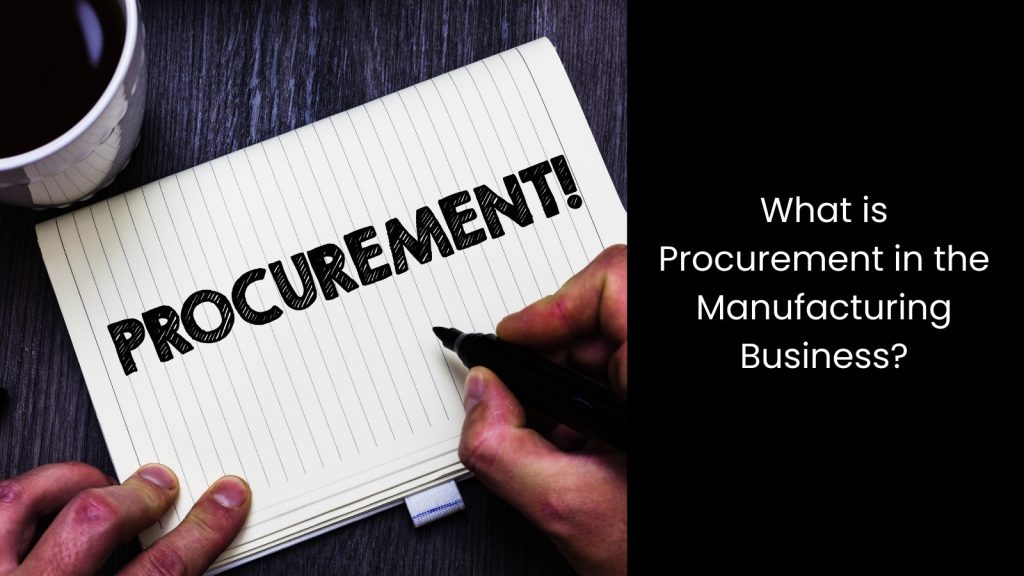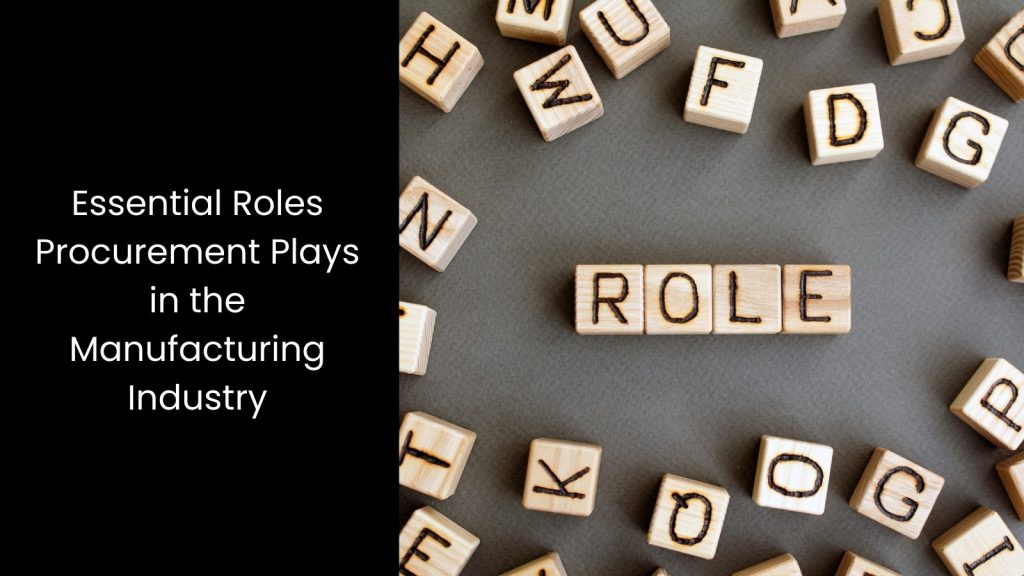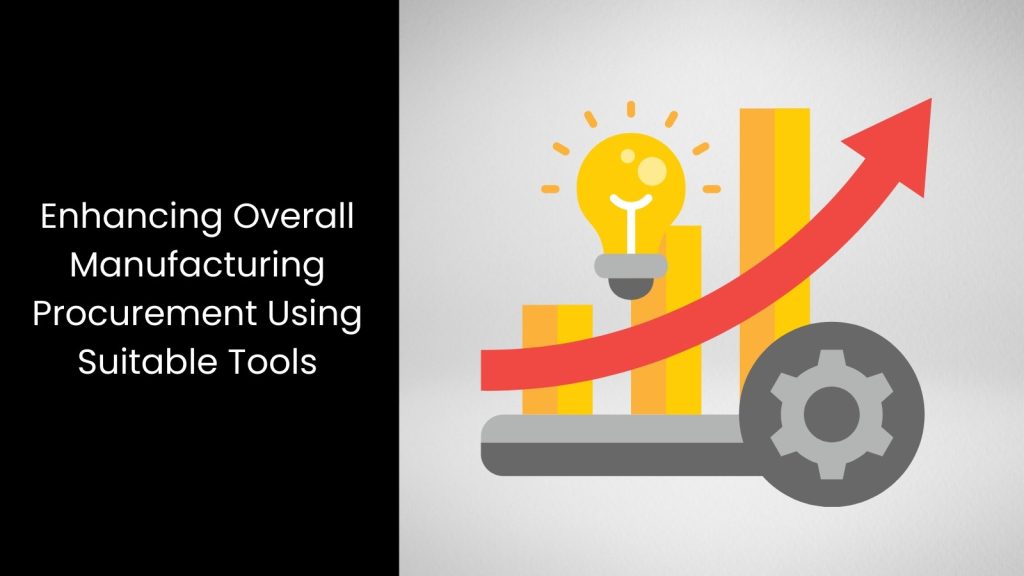Every successful manufacturing company relies on a hidden force that keeps production running smoothly, but few talk about it. While cutting-edge machinery and skilled labour steal the spotlight, an essential process works tirelessly behind the scenes. This is what makes sure factories never stop moving. Can you even think about a world where raw materials arrive late, suppliers fail to meet expectations, and production lines grind to a halt? The consequences could be disastrous, right? What keeps this chaos in check? The answer lies in a well-structured system that controls sourcing, supplier relationships, and cost management, which is ‘procurement’ in one word!
In this article, we talk about the role of procurement in the manufacturing world.
In this article, we talk about the role of procurement in the manufacturing world.
What is Procurement in the Manufacturing Business?

- Procurement is the process of sourcing, purchasing, and managing materials, components, and services that a manufacturing company needs to produce goods.
- Every factory relies on a steady flow of raw materials, tools, and equipment, which makes procurement a key part of keeping production lines running smoothly. The process starts with identifying what the company needs, researching suppliers, requesting quotes, negotiating terms, and finalising contracts.
- After that, the procurement team places orders, tracks deliveries, inspects quality materials, and handles payments. In a manufacturing business, procurement specialists, supply chain managers, and purchasing officers handle these tasks, working closely with production teams to ensure everything arrives on time and meets required standards.
- There is no further proceeding without procurement. Do you know why? Without the latter, manufacturers would struggle to maintain inventory levels. This will eventually lead to production delays and lost revenue. Every decision in this process affects manufacturing efficiency, supplier relationships, and cost control, making it essential to choose the right vendors and manage contracts properly.
- It does not end there! Manufacturing procurement also includes evaluating alternative materials, keeping up with market trends, and ensuring compliance with industry regulations.
- As companies aim for smoother operations, procurement teams must stay proactive. That is how they can prevent supply chain disruptions and ensure that factories never run out of essential supplies.
Essential Roles Procurement Plays in the Manufacturing Industry

Supplier Selection and Management
Supplier connections are the number one factor that keeps manufacturing procurement running without disruptions. It makes supplier selection and management a major responsibility for procurement teams.
Every factory depends on a network of vendors to deliver quality raw materials and components, so choosing the right suppliers means looking beyond price tags. Procurement teams research potential vendors, compare their reputation, production capacity, and reliability, and negotiate terms that align with the company’s needs.
They examine product samples, review previous client feedback, and assess delivery timelines before signing contracts. Once they establish supplier relationships, they do not stop there. They track performance, ensuring vendors meet quality standards, deliver on schedule, and stick to agreed pricing.
If a supplier starts cutting corners, delaying shipments, or increasing costs without reason, procurement teams step in. Then, they renegotiate terms or replace them with better alternatives. Apart from that, regular supplier audits, open communication, and market monitoring help them avoid risks like stock shortages or price fluctuations.
Manufacturing procurement also focuses on diversifying supply sources, preventing over-reliance on a single vendor. This approach reduces the chances of production delays when unexpected supply chain disruptions occur.
Every factory depends on a network of vendors to deliver quality raw materials and components, so choosing the right suppliers means looking beyond price tags. Procurement teams research potential vendors, compare their reputation, production capacity, and reliability, and negotiate terms that align with the company’s needs.
They examine product samples, review previous client feedback, and assess delivery timelines before signing contracts. Once they establish supplier relationships, they do not stop there. They track performance, ensuring vendors meet quality standards, deliver on schedule, and stick to agreed pricing.
If a supplier starts cutting corners, delaying shipments, or increasing costs without reason, procurement teams step in. Then, they renegotiate terms or replace them with better alternatives. Apart from that, regular supplier audits, open communication, and market monitoring help them avoid risks like stock shortages or price fluctuations.
Manufacturing procurement also focuses on diversifying supply sources, preventing over-reliance on a single vendor. This approach reduces the chances of production delays when unexpected supply chain disruptions occur.
Cost Control and Reduction
There is no progress unless manufacturing procurement keeps material costs under control.
We all know that every factory runs on a budget, and procurement teams stretch every dollar by negotiating supplier contracts. They secure better payment terms and lock in bulk purchasing discounts. They do not just chase the lowest price! Instead, they dig deeper, comparing vendors, analysing market trends, and ensuring that cheaper options do not mean poor quality.
Smart negotiations help them strike deals that balance affordability with reliability and prevent unexpected cost spikes that could eat into profits. Procurement specialists also build long-term relationships with suppliers, which normally leads to exclusive pricing, priority service, and flexible terms during financial downturns.
Further, bulk purchasing plays a major role in keeping expenses in check, as larger orders usually come with significant price cuts. But buying in bulk also requires careful inventory planning to avoid waste or storage issues. This is one aspect where procurement teams work closely with production managers to predict demand. They ensure they order just enough to keep operations running without unnecessary excess. They also track material price fluctuations, sourcing alternatives when costs rise and adjusting purchasing strategies to keep expenses stable.
There is no doubt that strong procurement practices prevent financial waste and help manufacturers reinvest savings into better things.
We all know that every factory runs on a budget, and procurement teams stretch every dollar by negotiating supplier contracts. They secure better payment terms and lock in bulk purchasing discounts. They do not just chase the lowest price! Instead, they dig deeper, comparing vendors, analysing market trends, and ensuring that cheaper options do not mean poor quality.
Smart negotiations help them strike deals that balance affordability with reliability and prevent unexpected cost spikes that could eat into profits. Procurement specialists also build long-term relationships with suppliers, which normally leads to exclusive pricing, priority service, and flexible terms during financial downturns.
Further, bulk purchasing plays a major role in keeping expenses in check, as larger orders usually come with significant price cuts. But buying in bulk also requires careful inventory planning to avoid waste or storage issues. This is one aspect where procurement teams work closely with production managers to predict demand. They ensure they order just enough to keep operations running without unnecessary excess. They also track material price fluctuations, sourcing alternatives when costs rise and adjusting purchasing strategies to keep expenses stable.
There is no doubt that strong procurement practices prevent financial waste and help manufacturers reinvest savings into better things.
Quality Assurance
When the quality is concerned, manufacturing procurement takes the lead in making sure every material and component meets industry standards and compliance rules.
The reason is that factories cannot afford to work with defective or low-grade supplies. Therefore, procurement teams go beyond just placing orders. They carefully select suppliers that follow strict manufacturing regulations, checking certifications, testing product samples, and inspecting production facilities before signing any agreements.
However, quality assurance does not stop at selection. These procurement specialists monitor incoming shipments and ensure vendors stick to agreed specifications and deliver consistent quality. If a batch arrives with defects or inconsistencies, procurement teams reject it, demand replacements, or renegotiate terms to prevent future problems.
Compliance is another thing here, as manufacturing companies must meet safety, environmental, and performance regulations to avoid legal trouble and product recalls. Procurement teams stay updated on changing industry laws, and they make sure suppliers follow ethical sourcing practices, proper material handling, and sustainability guidelines.
Regular supplier evaluations help detect issues early, reducing risks that could lead to faulty products or production delays. Procurement teams explore alternative materials and better manufacturing techniques to improve product durability without increasing costs.
The reason is that factories cannot afford to work with defective or low-grade supplies. Therefore, procurement teams go beyond just placing orders. They carefully select suppliers that follow strict manufacturing regulations, checking certifications, testing product samples, and inspecting production facilities before signing any agreements.
However, quality assurance does not stop at selection. These procurement specialists monitor incoming shipments and ensure vendors stick to agreed specifications and deliver consistent quality. If a batch arrives with defects or inconsistencies, procurement teams reject it, demand replacements, or renegotiate terms to prevent future problems.
Compliance is another thing here, as manufacturing companies must meet safety, environmental, and performance regulations to avoid legal trouble and product recalls. Procurement teams stay updated on changing industry laws, and they make sure suppliers follow ethical sourcing practices, proper material handling, and sustainability guidelines.
Regular supplier evaluations help detect issues early, reducing risks that could lead to faulty products or production delays. Procurement teams explore alternative materials and better manufacturing techniques to improve product durability without increasing costs.
Cost-Benefit Analysis
If manufacturers can analyse every dollar spent, they can make smarter procurement decisions that boost efficiency without draining resources. Don’t you think so?
That is why the manufacturing industry needs procurement, as it helps with cost-benefit analysis, making sure every purchase adds value rather than just cutting expenses. Procurement teams break down sourcing options, comparing costs, supplier reliability, material quality, and long-term benefits to avoid short-sighted decisions.
A lower price might seem attractive, but if it leads to production delays or higher maintenance costs, it is not worth it. Procurement specialists assess different purchasing strategies, like bulk buying, contract negotiations, and alternative sourcing, to find the best balance between affordability and performance. They also track market trends, predicting price changes and adjusting procurement plans before costs spike.
Every procurement decision ties back to manufacturing efficiency. So, teams work closely with production managers to avoid over-ordering, stock shortages, or waste. They also analyse logistics, checking if shipping fees, storage costs, or import taxes eat into the budget more than expected.
It is visible that smart procurement does not just save money. It strengthens supplier relationships, ensures smooth production, and keeps operations scalable.
That is why the manufacturing industry needs procurement, as it helps with cost-benefit analysis, making sure every purchase adds value rather than just cutting expenses. Procurement teams break down sourcing options, comparing costs, supplier reliability, material quality, and long-term benefits to avoid short-sighted decisions.
A lower price might seem attractive, but if it leads to production delays or higher maintenance costs, it is not worth it. Procurement specialists assess different purchasing strategies, like bulk buying, contract negotiations, and alternative sourcing, to find the best balance between affordability and performance. They also track market trends, predicting price changes and adjusting procurement plans before costs spike.
Every procurement decision ties back to manufacturing efficiency. So, teams work closely with production managers to avoid over-ordering, stock shortages, or waste. They also analyse logistics, checking if shipping fees, storage costs, or import taxes eat into the budget more than expected.
It is visible that smart procurement does not just save money. It strengthens supplier relationships, ensures smooth production, and keeps operations scalable.
Cerexio MES for a Levelled-Up Procurement Experience in Manufacturing

Cerexio Manufacturing Execution System (MES) enhances manufacturing procurement as it can provide real-time data on material usage, supplier performance, and inventory levels. Our system helps your procurement teams make informed decisions, reduce waste, and streamline orders. With Cerexio MES, manufacturers can easily gain a more efficient procurement experience.
Enhancing Overall Manufacturing Procurement Using Suitable Tools

Are you still struggling with inefficient procurement? It is not a lie that the right tools can transform your manufacturing process! You can achieve better cost control and operational efficiency if you upgrade to smarter procurement today!
